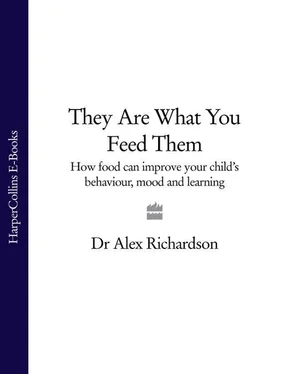They Are What You Feed Them
How food can improve your child’s behaviour, mood and learning

Cover Page
Title Page They Are What You Feed Them How food can improve your child’s behaviour, mood and learning
Part One Food And Mood The Basics Part One Food And Mood The Basics
Chapter 1 Starting Points Chapter 1 Starting Points Who Will Benefit from Reading this Book? I’ve written this book primarily for those of you who are parents and carers, and the information and advice have been tailored accordingly. Parents or guardians are usually the ones who have most responsibility for and influence over their children’s development, at least in the early years, and this is particularly true when it comes to food and diet. What parents don’t usually have, however, is easy access to reliable information about just how important good nutrition is to their child’s development—and especially to their child’s brain and behaviour. Having said that, many of the parents I’ve met have taught me a great deal about the links between food and behaviour, and in this book I’ll be doing my best to share with you the insights I’ve gained from working with these parents and their children. Many of them know a great deal more about this subject than most specialists in child behaviour, and I’ve sprinkled quotes from them throughout the book. They have often gained their knowledge the hard way, however, and sadly the professionals officially in charge of helping them and their children have not always been receptive to suggestions that diet could in any way be relevant to these children’s difficulties in behaviour, learning or mood. This book is about you taking charge and helping your child and yourself. For this reason, although this book is written mainly for parents, I hope that the material here will also be useful to the many practitioners in health, education, social services or other fields who are struggling to help the children in their care, as well as to the many support groups and charities whose invaluable work has been helping to fill the huge gaps left by official research, policy and practice. In my experience, it is parents, along with some professionals and support groups, who have often been the unsung heroes who have actually made some of the most important discoveries about how diet can affect children’s behaviour. Science is only just starting to follow up some of these discoveries—and, as usual, government policy tends to lag way behind.
Chapter 2 Facing The Facts Chapter 2 Facing The Facts When it comes to how much we—the public—usually get to know about the foods we eat, and what we’ve been feeding to our children for years now, I’m afraid it’s rather like the old joke about the ‘mushroom’ style of management, namely: ‘Keep them in the dark, and feed them ****.’ For a long time, both the food industry and successive governments have effectively kept quiet about many things they’ve known (or should have known) about the appalling nutritional quality of much of our food—and children’s food in particular. Many of these appalling facts are available to anyone willing to read up about this subject (although, ironically enough, I’ve found that some of the best books are often in the ‘politics and economics’ section of bookstores rather ‘nutrition’). 1 It took Jamie Oliver’s stunning TV series on the state of school dinners to bring some of these issues to public attention and make the UK Government finally admit that there is a problem. A poor diet leads to poor health. The real trouble is that cheap, low-quality foods and drinks bring big profits to those who get away with selling them. (All the better if the contract is with a Government agency and lasts for years, as some school dinner contracts do.) Reading through this chapter, have a think about whether there might be a connection between diet and why your child misbehaves, gets moody, is often tired, or has problems learning. If you saw Jamie’s School Dinners, you may remember that many people interviewed spoke about the dramatic changes in some children’s behaviour after ‘dumping the junk’ and feeding them with real, freshly cooked food. When the media followed up on this, they naturally wanted to track down the ‘scientific evidence’ for this remarkable phenomenon, and speak to the scientists involved in such research. So on one particularly memorable morning, I got four different phone calls on my mobile as I dashed between meetings in Oxford, London and Cambridge (via Luton airport to pick up a colleague!). When even the Financial Times joined in I realized that the ‘food and behaviour’ issue really had hit home. This was the aspect they all seemed to be interested in—and no surprises there, really. The only trouble was there clearly weren’t enough scientists to go around, so I found myself deluged for some time.
Chapter 3 What’s The Problem?
Part Two The Good, The Bad And The Unhealthy
Chapter 4 Essential Nutrients And Your Child’s Diet
Chapter 5 Digestion: They Are What They Absorb
Chapter 6 What To Avoid Additives, Anti-Nutrients, Allergies And Addictions
Chapter 7 Eating For Balanced Energy Putting The Right Fuel In The Tank
Chapter 8 Getting The Fats Right
Chapter 9 The Omega-3 Revolution Food For Thought
Part Three The Way Ahead Transforming Your Child’s Diet
Chapter 10 Top Tips For You And Your Child
Chapter 11 Your 12-Week Plan
Chapter 12 Recipes Ground Rules, Breakfasts, Snacks And Packed Lunches
Chapter 13 Recipes Light Meals And Sweet Stuff
Chapter 14 Recipes Main Meals
Appendix
RefeRences And Resources
Index
Copyright
About the Publisher
Part One Food And Mood The Basics
Chapter 1 Starting Points
Who Will Benefit from Reading this Book?
I’ve written this book primarily for those of you who are parents and carers, and the information and advice have been tailored accordingly. Parents or guardians are usually the ones who have most responsibility for and influence over their children’s development, at least in the early years, and this is particularly true when it comes to food and diet. What parents don’t usually have, however, is easy access to reliable information about just how important good nutrition is to their child’s development—and especially to their child’s brain and behaviour.
Having said that, many of the parents I’ve met have taught me a great deal about the links between food and behaviour, and in this book I’ll be doing my best to share with you the insights I’ve gained from working with these parents and their children. Many of them know a great deal more about this subject than most specialists in child behaviour, and I’ve sprinkled quotes from them throughout the book. They have often gained their knowledge the hard way, however, and sadly the professionals officially in charge of helping them and their children have not always been receptive to suggestions that diet could in any way be relevant to these children’s difficulties in behaviour, learning or mood.
This book is about you taking charge and helping your child and yourself.
For this reason, although this book is written mainly for parents, I hope that the material here will also be useful to the many practitioners in health, education, social services or other fields who are struggling to help the children in their care, as well as to the many support groups and charities whose invaluable work has been helping to fill the huge gaps left by official research, policy and practice. In my experience, it is parents, along with some professionals and support groups, who have often been the unsung heroes who have actually made some of the most important discoveries about how diet can affect children’s behaviour. Science is only just starting to follow up some of these discoveries—and, as usual, government policy tends to lag way behind.
Читать дальше













